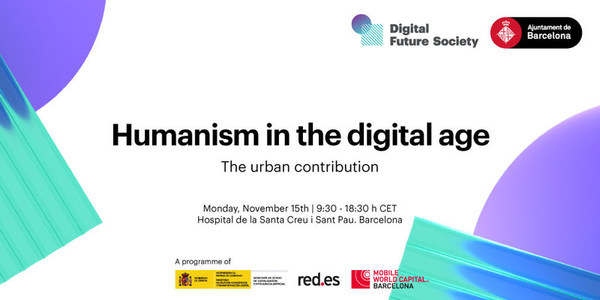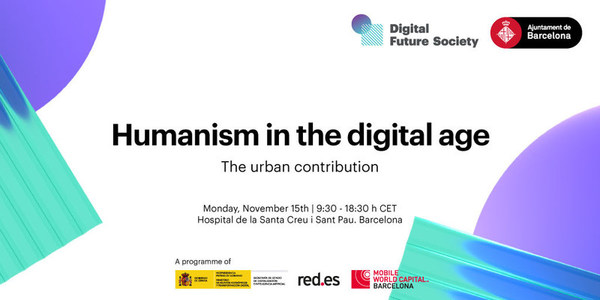BARCELONA, Spain, Nov. 12, 2021 /PRNewswire/ — Digital Future Society and the City Council of Barcelona jointly organize the event "Humanism in the digital age: the urban contribution" this 15th of November in Barcelona; where experts and opinion leaders will assess the impact of the current digital transformation in an urban environment, and discuss how to build a more sustainable, equitable and inclusive digital transition that strengthens human rights in the digital age, placing people at the centre of the technological deployment.
The various sessions of the day will explore and analyse some of the main challenges arising from the digital transformation in cities, with a special emphasis on two thematic blocks: ethics and Artificial Intelligence (AI) and digital rights. The program will host highly recognized international voices.
Likewise, the role of public administrations in front of the digital divides will be a highlighted topic during the day. Digital exclusion will be addressed and will explore projects, initiatives, and community approaches with the CTOs of Barcelona, Michael Donaldson, New York, John Paul Farmer, and the UNU-EGOV advisor, Morten Meyerhoff.
It will also seek to explore solutions about the fundamental challenges associated with AI. For example, this technology, increasingly used by public and private actors, cannot be adopted without considering the consequences of gender or race discrimination that it may perpetuate. To do so, the panel formed by Werner Stengg of the European Commission and Renata Ávila, CEO of the Open Knowledge Foundation, will consider its use in an ethical manner and explore how to guide it towards an effective regulation. In this area, the keynote with Sonia Jorge, Executive Director of World Wide Web Foundation, is also highlighted.
Within digital rights, the role of cities to approach an inclusive, secure, and responsible digital transformation, will gain relevance with a panel moderated by Barcelona’s Deputy mayor, Laia Bonet, and joined by representatives of municipal administrations such as Delphine Jamet (Bordeus); Roos Vermeij (Rotterdam) and Arnaud Ngatcha (Paris). And lastly, facial recognition technologies and the responsibility that their use entails will be another spotlight of the sessions of this block, moderated by Melissa Heikkil, from Politico Europe, with the presence of Sarah Chander, senior policy advisor of European Digital Rights Initiative; Amos Toh, Senior researcher on AI at Human Rights Watch, and Brando Benifei, European Parliament (MEP), Rapporteur on the AI Act.
Contact: Emily Henley – [email protected] – + 34 (0) 661 267 495




